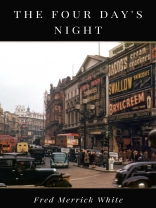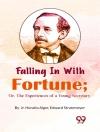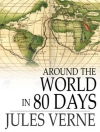Another in the ‘Doom of London’ series, in which the author sounds a clarion call of potential disasters that may fall upon the great city. Here he relates a tale of air pollution. Excerpt:
They crawled along through the black suffocating darkness, feeble, languid, and sweating at every pore. There was a murky closeness in the vitiated atmosphere that seemed to take all the strength and energy away. At any other time the walk to Clarence Terrace would have been a pleasure, now it was a penance. They found their objective after a deal of patience and trouble. Hackness yelled in the doorway. There was a sound of footsteps and Cynthia Grimfern spoke.
‘Ah, what a relief it is to know that you are all right, ‘ she said. ‘I pictured all sorts of horrors happening to you. Will this never end, Martin?’ She cried softly in her distress.
Hackness felt for her hand and pressed it tenderly. ‘We are going to try my great theory, ‘ he said. ‘Eldred is with me, and
we have got Williamson’s permission to operate with the aeroplane.’
Over de auteur
Fred Merrick White, a British author of many novels and short stories under the name ‘Fred M. White’, was born in 1859 in West Bromwich, a small town near Birmingham, England. The record of his birth indicates that his first name was actually ‘Fred’ not, as is often assumed, ‘Frederick.’ His second name ‘Merrick’ was the maiden name of his mother, Helen, who married his father, Joseph, in West Bromwich in the September quarter of 1858.
Before becoming a full-time writer, Fred M. White followed in his father’s footsteps and worked as a solicitor’s clerk in Hereford. By 1891, Fred M. White, then 31 years old, was working full-time as a journalist and author. The First World War and his 2 sons’ war-time experiences as junior officers in the British military evidently influenced Fred M. White’s writing during and after this conflict. His novel The Seed Of Empire, published in 1916, describes some of the early trench warfare in great detail the places and happenings are historically accurate. A number of novels published in the 1920s describe the social changes caused by the war and the difficulties of ex-soldiers in fitting back into normal civilian life.
Perhaps best known for his ‘Doom of London’ stories, in which that city experiences a series of devastating catastrophes, Fred M. White produced a huge body of short stories and novels, mainly in the genres of crime, romance and science fiction. He was an avid golfer, which shows in some of his novels, along with fly-fishing and the card game of Bridge.
Fred and his wife Clara spent their final years in Barnstaple in the County of Devon, an area which provided the backdrop for his novels The Mystery Of Crocksands, The Riddle Of The Rail, and The Shadow Of The Dead Hand. He died in the December quarter of 1935; his wife died in 1940.












